Installing Akaunting Accounting on Ubuntu 20.04

Written in PHP, Sound is a versatile and open source online accounting software that allows users to manage their finances and track all their bills, fees and expenses, mentioning just a few financial tasks.
It is an ideal online accounting platform for small businesses who cannot afford to acquire expensive accounting software. Akaunting offers a sleek and intuitive interface that includes all the features and controls you need to stay up-to-date on your cash flows and events.
Dazzling features
Notable features include:
- Multi-currency support.
- Visual reporting using charts.
- Supplier management system.
- Ability to send invoices to clients via SMTP protocol (requires an email server configured for your server).
- Create and manage invoices, bills, and other payments for work in progress.
- Ability to accept bulk payments.
- Discount management system.
- Customer Summary.
In this guide, we will guide you through the installation Sound free self-hosted accounting software Ubuntu 20.04.
Step 1: Install LAMP Stack on Ubuntu
Since Sound Customers and the administrator mostly use the interface and require a database server in order for all the data to be stored, we need to start by installing the LAMP stack. We already have a detailed guide on installing the LAMP stack on Ubuntu 20.04. This is handy before you continue.
Some additional PHP modules are required Akaunting software to work without problems. Therefore, install the following PHP modules.
$ sudo apt install libapache2-mod-php php7.4-mysql php7.4-gd php7.4-cli php7.4-imagick php7.4-common php7.4-mysql php7.4-gd php7.4-bcmath php7.4-json php7.4-curl php7.4-zip php7.4-xml php7.4-mbstring php7.4-bz2 php7.4-intl php7.4-imap php7.4-ldap php7.4-xmlrpc php7.4-soap
Step 2: Create an Akaunting database
Next, we are going to create a database Sound On the MariaDB database server. This is the database that Akaunting uses to store all its data.
Therefore, log in to the MariaDB server.
$ sudo mysql -u root -p
Create a database and a database user.
MariaDB [(none)]> CREATE DATABASE akaunting; MariaDB [(none)]>CREATE USER 'akaunting_user'@'localhost' IDENTIFIED by '[email protected]';
Then grant all rights to the user in the database.
MariaDB [(none)]>GRANT ALL ON akaunting.* TO 'akaunting_user'@'localhost';
Finally, save your changes and exit the MariaDB prompt.
MariaDB [(none)]>FLUSH PRIVILEGES; MariaDB [(none)]>EXIT;
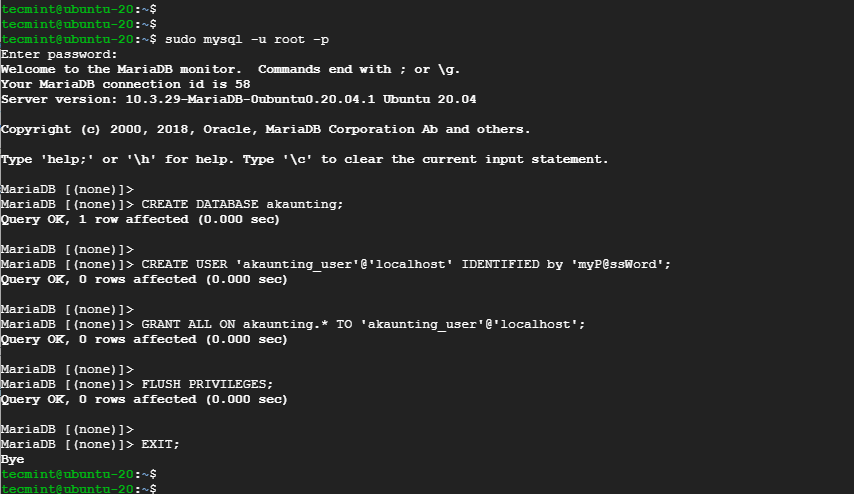
Step 3: Install the Akaunting software on Ubuntu
Once the database is in place, we will next download the latest version Sound which comes to the archive to be compressed. You can do this by using the wget command as shown.
$ wget -O Akaunting.zip https://akaunting.com/download.php?version=latest
Next, create a directory in the web directory,
$ sudo mkdir -p /var/www/akaunting/
And then extract the contents of the compressed archive to a directory.
$ sudo unzip Akaunting.zip -d /var/www/akaunting/
Next, set the ownership of the directory for the web data user and group.
$ sudo chown www-data:www-data -R /var/www/akaunting/
And the permissions as follows.
$ sudo chmod -R 755 /var/www/akaunting/
Step 4: Configure Apache Virtual Host for Akaunting in Ubuntu
We need to define a virtual host file for the Akaunting site. This allows Apache to host the site without conflicts with Apache’s default virtual host file.
Follow these steps to set up a virtual host file with your favorite text editor.
$ sudo vim /etc/apache2/sites-available/akaunting.conf
Paste the displayed content. Remember to switch yourdomain.com with your fully configured domain or IP address of your server.
ServerName yourdomain.com DocumentRoot /var/www/akaunting/ DirectoryIndex index.php Options +FollowSymLinks AllowOverride All Require all granted ErrorLog ${APACHE_LOG_DIR}/akaunting.error.log CustomLog ${APACHE_LOG_DIR}/akaunting.access.log combined
Save the changes and exit the settings file. Then enable the virtual host file and the Apache rewrite module.
$ sudo a2ensite akaunting.conf $ sudo a2enmod rewrite
Additionally, disable the default Apache virtual host file.
$ sudo a2dissite 000-default.conf
Restart Apache for the changes to take effect.
$ sudo systemctl restart apache2
Step 5: Complete the installation of Akaunting in Ubuntu
All configurations and settings are now in place. The only step left is to complete the installation with a browser. Launch your browser and visit your server’s IP address or Fully Qualified Domain Name (FQDN).
http://server-IP or domain name
The settings page below greets you and prompts you to select your preferred language.
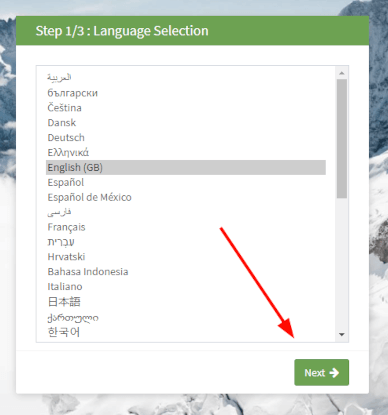
Next, enter the database information that you specified when you created the database and clickNext’.
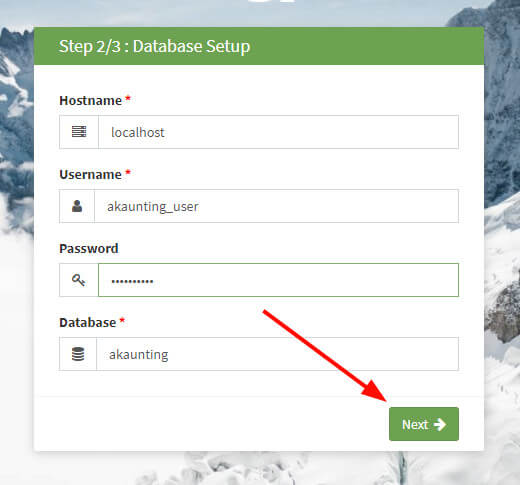
ENTRY: Current publication at the time of writing ( 1.3.17 ) contains an error that produces a PHP error that appears in the browser. Here is an excerpt from the error.
(1/1) ErrorException Trying to access array offset on value of type int in ArrayInput.php line 135
Open the workaround ArrayInput.php file.
$ sudo vim akaunting/vendor/symfony/console/Input/ArrayInput.php
Go to line 135 and change it:
} elseif ('-' === $key[0]) {
to recipient:
} elseif (isset($key[0]) && '-' === $key[0]) {

Save the file, and then refresh the installation page.
In the last step, fill in the company and administrator information and clickNext“.
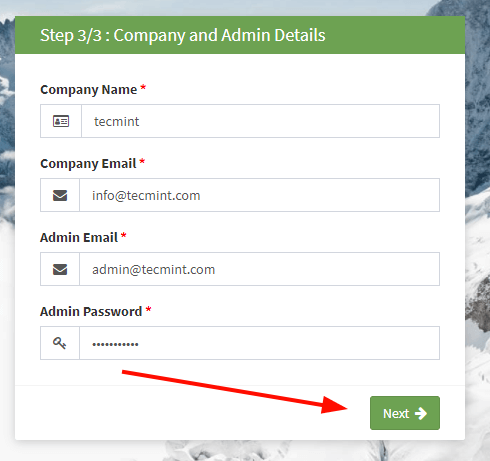
Finally, the dashboard appears. Here you can continue calculations and track expenses.
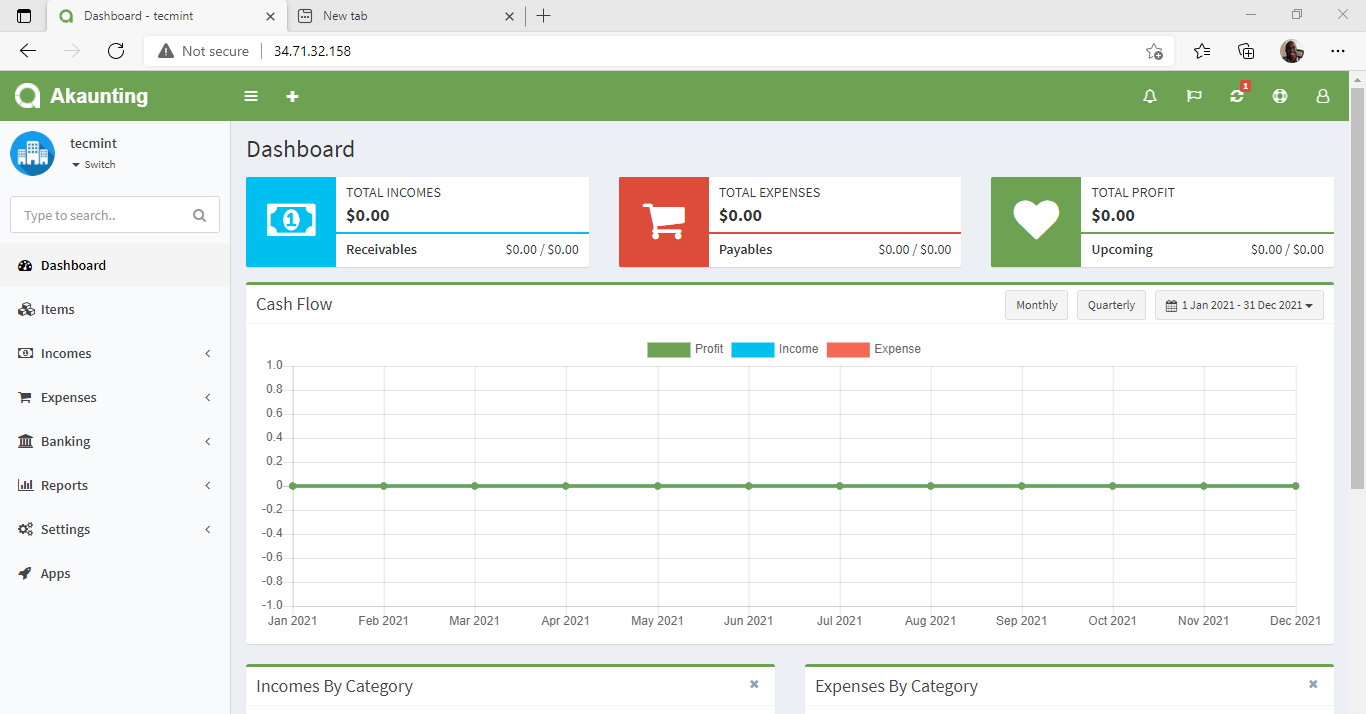
This will complete the installation of this guide Akauting software on Ubuntu 20.04.
If you appreciate what we do here at TecMint, you need to consider:
TecMint is the fastest growing and most trusted community site for all kinds of Linux articles, guides, and books online. Millions of people visit TecMint! Search or browse thousands of published articles that are accessible to everyone.
If you like what you read, consider buying us coffee (or 2) as a thank you.
We are grateful for your endless support.

Comments
Post a Comment